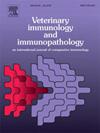粗纤维连接蛋白和重组纤维连接蛋白抗原对实验感染犬细粒棘球蚴的血清学诊断和治疗后监测
IF 1.4
3区 农林科学
Q4 IMMUNOLOGY
引用次数: 0
摘要
细粒棘球绦虫是一种人畜共患寄生虫,可导致囊性棘球蚴病,这是一个重大的公共卫生问题。由于缺乏临床症状,最终宿主(如狗)中颗粒棘球绦虫感染的诊断具有挑战性。本研究旨在评价粗抗原(EgSCA)和重组抗原(rEgFN162)在犬颗粒棘球绦虫感染检测中的诊断性能。此外,它还寻求确定最合适的抗原和方法,用于基于人群的筛查和治疗后监测。采用槟榔碱氢溴化物净化法,从实验感染犬身上收集成颗粒棘球绦虫。通过冻融循环、超声和过滤制备可溶性粗抗原(EgSCA),通过大肠杆菌基因克隆、表达和纯化获得重组纤维连接蛋白(rEgFN162)。采用SDS-PAGE和Western blot分析EgSCA和rEgFN162的抗原性。采用酶联免疫吸附试验(ELISA)评估实验感染和治疗犬的IgG和IgM反应。IgG ELISA结果显示,EgSCA的敏感性为96.66 %,特异性为66.66 %;rEgFN162的敏感性为76.66 %,特异性为46.66 %。在Western blot分析中,EgSCA的敏感性为90 %,特异性为83.33 %,而rEgFN162的敏感性为66.66 %,特异性为73.33 %。重组抗原对细粒棘球绦虫感染和其他蠕虫感染具有较高的区分能力。研究结果提示,rEgFN162在犬颗粒棘球绦虫的血清诊断中具有潜在的应用前景,在流行病学研究和治疗后随访中具有潜在的应用价值。需要更大样本量的进一步验证,以确认其在自然感染中的诊断准确性。本文章由计算机程序翻译,如有差异,请以英文原文为准。
Serological diagnosis and post-treatment monitoring of Echinococcus granulosus in experimentally infected dogs using crude and recombinant fibronectin antigens
Echinococcus granulosus is a zoonotic helminth responsible for cystic echinococcosis, a significant public health concern. The diagnosis of E. granulosus infections in definitive hosts, such as dogs, is challenging due to the absence of clinical signs. This study aimed to evaluate the diagnostic performance of crude (EgSCA) and recombinant (rEgFN162) antigens for the detection of E. granulosus infection in dogs using ELISA and Western blot assays. Additionally, it sought to identify the most suitable antigen and method for population-based screening and post-treatment monitoring. Adult E. granulosus parasites were collected from experimentally infected dogs using arecoline hydrobromide purgation. Soluble crude antigen (EgSCA) was prepared through freeze-thaw cycles, sonication, and filtration, while recombinant fibronectin protein (rEgFN162) was obtained via gene cloning, expression, and purification in E. coli. The antigenic properties of EgSCA and rEgFN162 were analyzed by SDS-PAGE and Western blot. ELISA assays were performed to assess IgG and IgM responses in experimentally infected and treated dogs. Based on IgG ELISA results, EgSCA showed a sensitivity of 96.66 % and specificity of 66.66 %, while rEgFN162 demonstrated a sensitivity of 76.66 % and specificity of 46.66 %. In Western blot analysis, EgSCA achieved a sensitivity of 90 % and specificity of 83.33 %, whereas rEgFN162 showed 66.66 % sensitivity and 73.33 % specificity. The recombinant antigen showed a higher ability to differentiate E. granulosus infections from other helminth infections. The findings suggest that rEgFN162 is a promising candidate for the serodiagnosis of E. granulosus in dogs, with potential applications in epidemiological studies and post-treatment follow-up. Further validation with larger sample sizes is needed to confirm its diagnostic accuracy in natural infections.
求助全文
通过发布文献求助,成功后即可免费获取论文全文。
去求助
来源期刊
CiteScore
3.40
自引率
5.60%
发文量
79
审稿时长
70 days
期刊介绍:
The journal reports basic, comparative and clinical immunology as they pertain to the animal species designated here: livestock, poultry, and fish species that are major food animals and companion animals such as cats, dogs, horses and camels, and wildlife species that act as reservoirs for food, companion or human infectious diseases, or as models for human disease.
Rodent models of infectious diseases that are of importance in the animal species indicated above,when the disease requires a level of containment that is not readily available for larger animal experimentation (ABSL3), will be considered. Papers on rabbits, lizards, guinea pigs, badgers, armadillos, elephants, antelope, and buffalo will be reviewed if the research advances our fundamental understanding of immunology, or if they act as a reservoir of infectious disease for the primary animal species designated above, or for humans. Manuscripts employing other species will be reviewed if justified as fitting into the categories above.
The following topics are appropriate: biology of cells and mechanisms of the immune system, immunochemistry, immunodeficiencies, immunodiagnosis, immunogenetics, immunopathology, immunology of infectious disease and tumors, immunoprophylaxis including vaccine development and delivery, immunological aspects of pregnancy including passive immunity, autoimmuity, neuroimmunology, and transplanatation immunology. Manuscripts that describe new genes and development of tools such as monoclonal antibodies are also of interest when part of a larger biological study. Studies employing extracts or constituents (plant extracts, feed additives or microbiome) must be sufficiently defined to be reproduced in other laboratories and also provide evidence for possible mechanisms and not simply show an effect on the immune system.

 求助内容:
求助内容: 应助结果提醒方式:
应助结果提醒方式:


